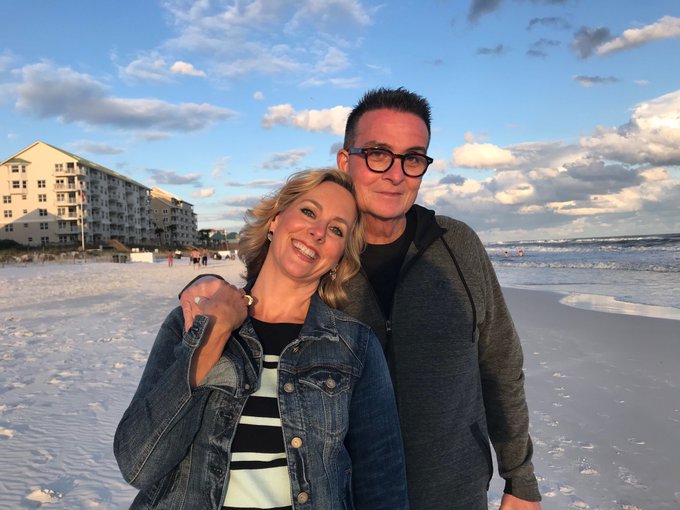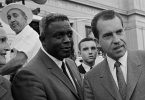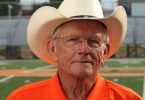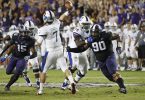To comprehend just how uncomfortable it was when Marty Griffin recently found himself in an adjacent radio studio to Michael Irvin – separated by only glass and four feet – you have to grasp a toxic time like no other in the history of the Dallas Cowboys and/or DFW media.
In the 1990s …
It wasn’t news when the Cowboys won the NFC East, because they hung Super Bowl banners.
It wasn’t news when a player like Ezekiel Elliott was briefly detained at a music festival in a Lakers jersey and handcuffs, because players like Irvin wore full-length mink coats to courtroom drug trials.
It wasn’t news when Dale Hansen went unplugged, because Griffin was deep undercover.
In an era when Irvin was running his pet “skinny post” to win three rings and cultivate a Hall of Fame career on the field, Griffin was throwing gas on the local TV ratings fire by forging a reputation as the Metroplex’s top investigative muckraker and NBC5’s “Public Defender.” Irvin was the Cowboys’ loquacious and bombastic leader who doubled as the best receiver in franchise history. Griffin was a street-smart and charismatic persona that rocketed from a meteorologist in Wichita Falls to pre-TMZ Harvey Levin.
In 1996, the two stubborn stars with insatiable egos crossed paths, butted heads and created one of the most compelling and controversial dramas in DFW history.
“I was stupid and naive. I got caught up in the flash of Dallas like a moth to a flame,” Griffin said by phone last week from his native Pittsburgh, where he now hosts a daily radio show. “One minute I was at the pinnacle of success and the next I was about to be run out of town. I remember laying on my couch wondering if I’d ever work again.”
It was 23 years ago this month – during TV ratings’ “sweepstakes” week – that NBC5 aired Griffin’s “Tarnished Star” expose. Leading the 10 p.m. newscast for six consecutive nights, the story centered on a hidden-camera investigation of Irvin. The dark, fuzzy video showed Irvin talking about, in detail, using cocaine with teammates and even arranging and buying drugs.
Sweetening the pot: Two months earlier, Irvin had been indicted on drug charges after being caught in an Irving Residence Inn with two topless dancers, sex toys and plenty of “product.” One of the dancers was the wife of Dallas police officer Johnny Hernandez, who was later arrested for hiring an undercover FBI agent posing as a “hit man” to murder Irvin. Dallas cops, a federal judge, the Cowboys and the NFL were aware of Griffin’s new video. And Channel 5 obtained it by paying an informant named Dennis Pedini $6,000 to equip his car with cameras and chauffeur Irvin to his drug rendezvous.
Said Irvin on camera, “Boy, I can’t wait to get me a line or three.”
Though the series gripped the ratings as intended, the station was accused of “checkbook journalism” by critics and opponents. Some questioned whether NBC5 was part of the police department. Others wondered if the tactics eroded beyond reporting into entrapment. Was Irvin’s behavior merely chronicled? Or salaciously coerced?
“We’d rather be No. 2 than be doing what they’re doing,” Channel 8 executive news director John Miller said at the time. “It’s almost to the point where they’re programming the destruction of their credibility and people are watching it.”
While Channel 8 resorted to stories such as one revealing that Pedini had $600 in outstanding traffic tickets, Channel 5 stood by its story.
Said then-NBC5 general manager Doug Adams, “It’s amazing how sanctimonious people get when they’ve been scooped.”
The fallout from the story: Irvin was suspended for the first five games of 1997, while Griffin walked away with numerous broadcasting awards, an ethical black eye and lots of phone calls. One was from Nina Shahravan.
On New Year’s Eve 1996, Griffin presented viewers with another squalid episode of Bad ’Boys, reporting that Cowboys players rented a “white house” in Valley Ranch for drug-and-alcohol sexcapades with women, that some players were selling drugs and that – the biggest bombshell yet – teammate Erik Williams had raped Shahravan while Irvin held a gun to her head. Citing his previous Irvin story, Shahravan took her allegations not to the police, but rather Griffin. Channel 5 was first with breaking news again when Dallas police searched Williams’ home and left with 33 videotapes, Baby Oil, four guns and the green felt from the pool table where Shahravan said she had been sexually assaulted.
Ultimately though, Shahravan’s story and Griffin’s credibility crumbled.
Caught in a web of lies which mimicked her history of attention-seeking exaggeration, the former dancer not only recanted her tale but flipped sides and testified on behalf of the players when they, in turn, sued Channel 5 and Griffin. On Jan. 10, DPD announced “the allegations are not true and that a sexual assault did not take place.” If you’ve ever seen the video of Irvin throwing a trash can in the Valley Ranch locker room and chiding the media to report the false allegations with the “same intensity!!!”, this was the catalyst.
Shahravan was charged with perjury. And, just like that, the investigator became the investigated.
Williams and Irvin sued NBC5 for “libel, fraud and invasion of privacy” and each won $1.1 million. Combined, it was $1.7 million more than Richard Jewel received from NBC after being incorrectly identified as the bombing suspect at the Atlanta Olympics in 1996.
“I don’t necessarily regret it,” Griffin says now. “But could me and the station have handled it all better? Of course. In retrospect, it wasn’t worth it.”
By Thanksgiving of 1997, Griffin was let go by NBC5. Humbled and confused, he headed home to Pittsburgh.
“I was lower than low,” he says. “But Mom drove me to an interview, and I got hired on the spot. Coming home was the best decision I ever made.”
Griffin worked at iconic TV station KDKA and then slid over to the media giant’s radio network, where he still hosts a weekday afternoon show. At first he was the same Marty, watchdogging Pittsburgh with hidden cams and aggressive angles. But somewhere along the line, he changed. The hardened bulldog softened.
The Marty Griffin that would hide in hip-deep trash in a dumpster to catch a government worker exploiting his smoke break by 10 minutes eventually transformed into the Marty Griffin that raises awareness and funds to upgrade housing for 9/11 workers suffering from mesothelioma.
“Back in Dallas, raising hell was fun and easy,” he says. “But I decided it would be much more rewarding to use my position to make a positive difference.”
In his DFW heyday, Griffin was 37. He turns 60 next month.
He’s a husband, father of three and a recent cancer survivor. He temporarily lost 60 pounds and his voice during a battle with throat cancer, which he acquired via HPV and now passionately persuades his expansive audience to get vaccinated against.
Unknowingly, both Irvin and Griffin likely had developing throat cancer when two years ago they found themselves in proximity inside KDKA’s studios. Griffin was doing his normal show; Irvin was in town doing an interview for NFL Network.
The two – now both cancer-free – recognized each other, and exchanged a warm greeting.
“He was very cordial,” Griffin says. “Michael has an amazing personality. He’s always been off-the-charts charming. It was nice.”
To comprehend where Marty Griffin is, you can have to grasp where he’s been.
“I grew up,” he says. “I’m a better man now.”







